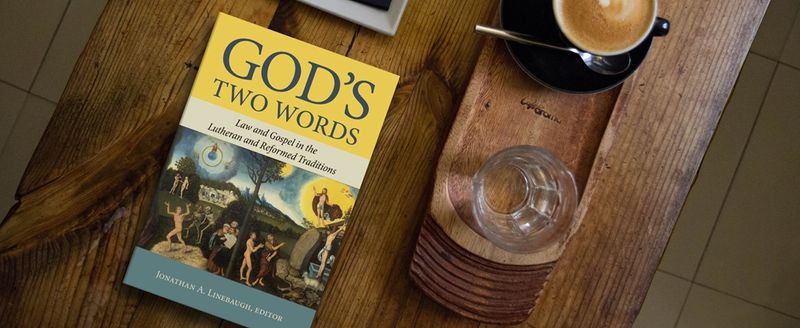In an emerging genre that includes recent titles from Brian Thomas (Wittenberg vs Geneva, 2016) and Robert Kolb & Carl R. Trueman (Between Wittenberg and Geneva: Lutheran and Reformed Theology in Conversation, 2017), Jonathan A. Linebaugh, lecturer in New Testament at the University of Cambridge, edits an outstanding contribution from noteworthy Lutheran and Reformed scholars on a shared yet divergently emphasized theological tradition that distinguishes God’s two words: law and gospel.
Given the confused state of evangelicalism and the theological drift of mainline denominations, God’s Two Words appears as an important and arguably necessary conversation that aids in redirecting all Lutheran and Reformed communions toward our unmistakable dominical mandate—the proclamation of the whole counsel of God.
Linebaugh’s introduction frames the Lutheran distinctive, recognizing that, from Luther onward, the distinction between law and gospel is not first a hermeneutical and homiletical strategy “that provides categories by which to index, interpret, and announce God’s word” (3). Rather, the distinction names the actions of the “living and active” word, “by which God interprets hearers, slays and makes alive. Historically, for Lutherans, the fundamental level at which the distinction between law and gospel operate, namely what Luther terms “the level of reality and experience.” In other words, how the Holy Spirit uses these words is basically existential—the law, particularly, is used by the Holy Spirit by way of its condemning function to accuse its auditors, eliciting the dictum, lex semper accusat—the law always accuses. It is the gospel that is truest to the nature and character of God; it is His proper work, while the law is His strange or alien work.
While both traditions agree that the revelation of God’s will expressed in terms of law and gospel, the Reformed hold a very different view of what is categorically foundational, namely the biblical covenants which give expression to divine words of law and gospel and hold the two together. But the Reformed also differ from Lutherans on the use of the law, holding in various ways what Herman Bavinck expressed when arguing that “the gospel is temporary; the law is eternal and precisely that which is restored by the gospel” (Reformed Dogmatics, 4:455).
While debated from the time of Luther and Calvin, these differences coalesced for centuries in their respective enclaves until they reemerged last century in an explosive, much-discussed exchange between Werner Elert, a Lutheran theologian at Erlangen, and Swiss theologian Karl Barth, prompted by the latter’s 1935 reversal of the traditional order of law and gospel with a publication entitled, “Gospel and Law.” Heavyweights from both traditions entered the fray, including Hermann Sasse and Louis Berkhof. The questions raised by the debate were not resolved, perpetuating two fundamentally different ways of studying theology. But while in the ensuing decades confessional groups may have drawn somewhat closer, for the most part ecclesiastical and scholarly conversations stalled. Linebaugh rekindles the cooled embers, but does so in cooler times and with minds well-suited to engender broader dialogue.
Sectioned into four parts, the opening essays from Piotr J. Malysz and Michael Allen explain why “The Law is Not the Gospel” in their respective traditions. Part two performs the same function, but this time the topic is “The Gospel is Not the Law” and includes a brilliant chapter from Charles P. Arand and a noteworthy contribution from Scott R. Swain. Pastors and seminarians will benefit from the third part’s (Law and Gospel in Theology and Ministry) theoretical and practical ministerial import, with contributions from Reformed standout professor Kelly M. Kapic and the always entertaining and insightful Steven Paulson. The final part treating Lutheran and Reformed Responses sees the conversation moving beyond certain impasses with discernment, dogmatic rank and dialogue, yet does not fall into ecumenical Pollyanna—differences remain and for important reasons: Lutherans tend to emphasize the cross or, more generally, Christ’s state of humiliation, while the Reformed place the onus on the new humanity of the crucified Christ associated with his resurrection and ascension (233). Erik H. Herrmann, Katherine Sonderegger, Mark C. Mattes and Kevin Vanhoozer round out the cast of contributors.
Offering a sustained conversation on the topic of God’s two words reveals not merely Linebaugh and the various contributors’ ability to accurately articulate Lutheran and Reformed positions in a scholarly enterprise, but (more importantly) their interest and concern for the health and welfare of contemporary Protestantism. God’s Two Words may also be seen as something of a summons to preachers, professors, and clerics.
Jonathan Linebaugh should further his successful efforts here with, at least, an additional volume on the Lord’s Supper with the aim of stimulating further conversations and hope that these communions may draw closer in doctrine and practice for the good of the church catholic.
John Bombaro (Ph.D.) is the programs manager at HDQRTS USMC, The Pentagon. He lives in Virginia with his wife and children.
Love books? Short on time? You’re in good company. Our editors believe that loving your neighbor–the one that sits next to you at church and the one that sits next to you in the office–means listening to your neighbor. That’s why Modern Reformation features in-depth reviews of recently-released books on everything from sociology and politics to theology and Christian living in every issue. Go to https://www.whitehorseinn.org/subscribe-to-modern-reformation-magazine/ and subscribe today to see what’s on this month’s bookshelf.




